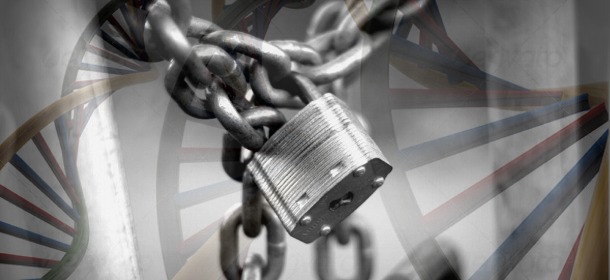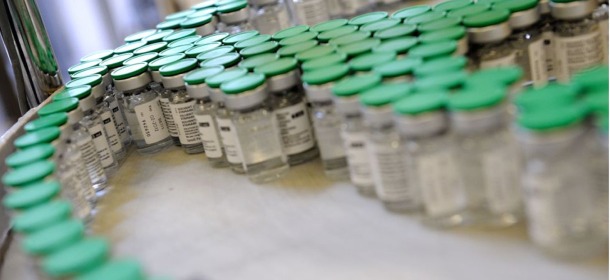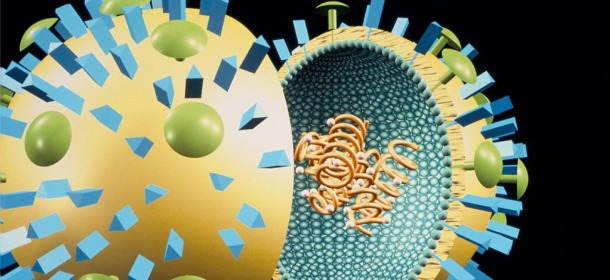Featured
Government Tracks Your DNA Without Your Consent
Our children are in the Brave New World. Their DNA is already being taken at birth and stored in state’s databases. Muddled excuses are used to take this most intimate of identifiers, but that suggestion is absurd, as they can be diagnosed without DNA. It’s being done for government databases.

Lock photo by Tequila Babs (with DNA helixes superimposed)
by Heidi Stevenson
(Revamped article)
Several states in the U.S. are storing your baby’s DNA sequence. It’s generally being done without your knowledge. All United States newborns’ DNA is now routinely screened for genetic disorders. Parental approval is not required—nor are parents informed. Our children are being born into a Brave New World.
Although the baby’s name is not supposed to be kept with the DNA samples, that begs the question of how parents are informed when their children are found to have genetic diseases. And who really believes that such information is kept private?
Supposed Benefits of Profiling Babies’ DNA
The claimed purpose of such testing is to detect genetic disorders for the babies’ benefit. That benefit, though, is questionable.
Screening for several genetic disorders, without taking DNA profiles, has been routine for several years. Conditions like Tay-Sachs disease, sickle cell anemia, and phenylketonuria (PKU) are discovered through blood tests, urine samples, and swabs. Thus far, there are no treatable conditions found in newborns that can’t be found through less intrusive means.
Annie Brown of Minnesota learned of the DNA testing done on her baby when she was informed that her daughter carried the cystic fibrosis gene. Later testing showed that the DNA test didn’t document that her daughter actually had the condition, and it must have put Annie and her husband through a lot of unnecessary stress.
The results of DNA testing may also be used against a person later in life. CNN reported Annie Brown saying:
It’s really a black mark against her, and there’s nothing we can do to get it off there. And let’s say in the future they can test for a gene for schizophrenia or manic-depression and your baby tests positive—that would be on there, too.”
The usual excuse for taking DNA samples of babies is to diagnose genetic disorders, but that doesn’t make sense, as treatable genetic disorders are already discovered without DNA screening. As Annie Brown’s story clarifies, it can also cause undue stress and unneeded extra testing.
Muddled excuses are used to take this most intimate of identifiers, but they don’t make sense. It’s an inefficient and inaccurate means of determining the existence of diseases that can already be identified through other, inexpensive means. So, the suggestion that the purpose is to screen for genetic diseases is absurd.
Likewise, the idea that it’s for crime prevention is absurd. Your fingerprints aren’t taken at birth and kept on a massive database. It would be considered far too intrusive. Yet, most states are now taking even more intimate DNA samples and placing them on a database without parental approval or knowledge.
Other methods are in use to expand DNA databases, most commonly taking DNA samples from anyone convicted of a crime, and often even those who merely come into contact with the law. The intent is to solve crimes, convict criminals, and free those who’ve been wrongfully convicted. However, the fact is that this most personal, private, and intimate physical part of each baby is now being harvested at birth and stored in databases without any assurances that private information will be kept private. In fact, as history has shown with social security numbers, which aren’t supposed to be used for identification, once such a system is implemented, privacy is ephemeral, at best.
Concerns about genetic diseases are often conflated with DNA research. If the purpose is for research, don’t the subjects have the right to be informed and agree to it? It certainly isn’t for the babies’ benefit, since DNA testing is inaccurate at determining the existence of disease, as shown in Annie Brown’s daugher, and there are accurate, inexpensive methods of diagnosis.
Europe
Europeans, in particular citizens of the United Kingdom, should also be concerned. Although the recent government attempts to expand the DNA database—already the world’s largest—have recently been stopped, don’t forget that backdoor methods, as is happening to newborns in the US, can be implemented at any time. The genetic profiles of innocent people are being kept on file now, not only those of people convicted of crimes.
According to the Independent, Sir Alec Jeffreys, who developed DNA fingerprinting, is dismayed at the government’s DNA database. He says:
DNA is intimately different to fingerprinting, it carries incredibly intimate information about who you are, where you’re from and your family.
The United Arab Emirates, certainly not a paragon of freedom, is planning to introduce a mandatory DNA database of every citizen. Is that a road we want to go down? If not, then perhaps it’s time to question this process that seems to be using the medical system to remove every aspect of privacy we have, and to track every detail of our lives.
Will people be shunted into particular careers based on their genetic data? For their own good, of course. Will you have to prick your finger and give a blood sample before you enter your site of employment each day? Deliver up a saliva sample? Will you be forced to undergo medical treatment for a genetic disease you may or may not develop? Where will it end?
Sources:
- The government has your baby’s DNA
- Newborn DNA Banking
- A tangled debate centers on newborns’ DNA
- Government DNA database plans do not conform with EU court ruling, says equality body
- Government’s DNA-mining is out of control, California stores genetic profile samples indefinitely
- DNA pioneer lambasts government database policy
- The Big Question: Why is Britain’s DNA database the biggest in the world, and is it effective?
Tagged babies’ dna harvested, baby dna taken at birth, brave new world of dna, brave new world of dna databases, politics, states’ dna databases
















Pingback: Brave New World- DNA collection | A Sheep No More
Pingback: Government Tracks Your DNA Without Your Consent | The Liberty Beacon
Pingback: The suffering of vaccine-incapacitated children in Chad continues unabated — Project Pan-Africa